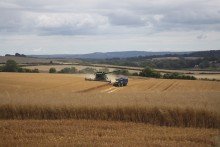A farm in Dorset will be taking part in a new and unique collaboration between the Wildlife Trusts, Linking Environment and Farming (LEAF) and Jordans, to create a new model for sustainable farming.
The Jordans Farm Partnership will see 42 progressive arable farms nationally take part in the new scheme, which is designed to address key issues facing rural communities today, including the decline of priority wildlife species, producing more food for a growing population, the need to reduce greenhouse gases associated with agriculture and the need to support rural communities.
Field Barn Farm in Winterbourne, Dorset, will be taking part in the scheme and growing crops for Jordans, who provide help to grow the best possible oats. Farm manager, Graham Birch said, “Working with DWT is very worthwhile as they are providing practical help to develop our wildlife action plan and begin monitoring our breeding birds’ population. In doing this, the consumer can be confident that by purchasing Jordans cereals, they are helping reinforce and sustain wildlife friendly farming. We are setting aside 10% of our land to provide wildlife habitats and in particular, we are trying to link-up habitats to create wildlife corridors. I would love to enhance our existing natural wildflower meadows, with a bit of extra effort I believe that we can create better conditions for our four species of chalk downland orchids.”
Some of the features on Field Barn Farm’s action for wildlife include creating excellent habitat for corn buntings, which involves setting aside large areas for nesting and feeding. The results are already showing a thriving community of increasingly rare farmland birds.
DWT’s Conservation Officer, Emily Newton will be acting as a wildlife advisor for Field Barn Farm. She said, “Dorset Wildlife Trust has a long history of working with farmers locally to help maximise the wildlife habitats on their land, so we’re delighted to be working with Field Barn Farm on this initiative. We’ll be advising them on how they can use their land to benefit wildlife, and we’ll be monitoring grasslands, farmland birds and the presence of insects through surveys to track their progress. This is a great opportunity not only for wildlife, but also for the consumer to get the best quality oats in their products from Jordans.”
To find out more about this initiative visit https://www.wildlifetrusts.org/Jordans







